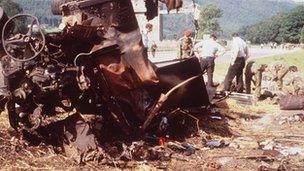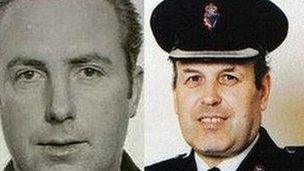Smithwick Tribunal: Taoiseach called bombing a 'political crime'
- Published

18 soldiers were killed in the Narrow Water atrocity in 1979
The Smithwick Tribunal has heard that in 1980, the Taoiseach, "from the outset of the enquiry decreed" that the Warrenpoint killings were a "political crime and no assistance would be given to the RUC".
Eighteen soldiers died in the Narrow Water bomb attack close to Warrenpoint in August 1979.
The bombs were detonated from a site in County Louth.
Jack Lynch was the Taoiseach at the time of the attack in 1979.
Charles J Haughey was the Taoiseach in 1980.
The claim was made by Witness 68, a former deputy assistant chief constable of the RUC, who was also the chief investigating officer of the Narrow Water bomb attack.
Witness 68 said that he attended a meeting between senior Garda, including Assistant Garda Commissioner McLaughlin, and senior RUC officers, including RUC Chief Supt Bill Mooney, at Dublin Castle in 1980.
Witness 68 said that the meeting, which lasted an hour, became "acrimonious".
"Mr McLaughlin said that the Taoiseach, from the outset of the enquiry decreed that the killings were a political crime and no assistance would be given to the RUC," he said.
"Mr McLaughlin was very firm and said there was nothing further in relation to Warrenpoint and we were not to come back."
Witness 68 described himself as a "bag-carrier" compared to others at the meeting in Dublin Castle.
"I was investigating Warrenpoint, I was junior to all those who were present."

The tribunal is probing allegations of collusion in the IRA murders of RUC officers Harry Breen and Bob Buchanan in 1989
The chairman of the tribunal, Judge Peter Smithwick, deemed that "for better or worse" the evidence of Witness 68 should be given following an objection by a legal representative of Ireland's Attorney General.
Nuala Butler said the "public interest sought representation" at the tribunal in "exceptional circumstances" and was seeking to have the tribunal "restrain itself".
"Given the sensitivity of the matter it is not appropriate for the tribunal to hear the evidence, and it is not related to the matters within the tribunal's terms of reference, it is of no public interest," she said.
However, Judge Smithwick said the evidence should not be "smothered" on the grounds of its sensitivity.
Devastating evidence
Witness 68 also told the tribunal that the lives of "at least a dozen people in the border area could have been saved" had charges been brought against two men arrested following the Narrow Water atrocity.
Brendan Burns and Joe Brennan were arrested close to Omeath, County Louth, as suspects but were released without charge.
The former RUC officer said he was given to read, on Tuesday morning, a Garda forensic report on the County Louth scene.
"For the first time I am getting an insight into evidence which I find devastating against Burns and Brennan," he said.
"They were only charged with motoring offences.
"Why were they not prosecuted under the explosives act, conspiracy to bomb? They walked away without any charges at all."
"Mr Corrigan had an opportunity to do a great thing for the Garda Siochana that day but the fact of the matter is he did not.
"Those two men killed at least a dozen more people along the border area. If Mr Corrigan did what he was expected those lives could have been saved."
Mr Corrigan is one of three former gardai under the spotlight at the Dublin tribunal. He is now retired and denies all allegations of collusion against him.
The Smithwick Tribunal is investigating allegations of Garda collusion in the 1989 IRA murders of two senior RUC officers, Chief Supt Harry Breen and Supt Bob Buchanan.
- Published28 February 2012
- Published16 February 2012